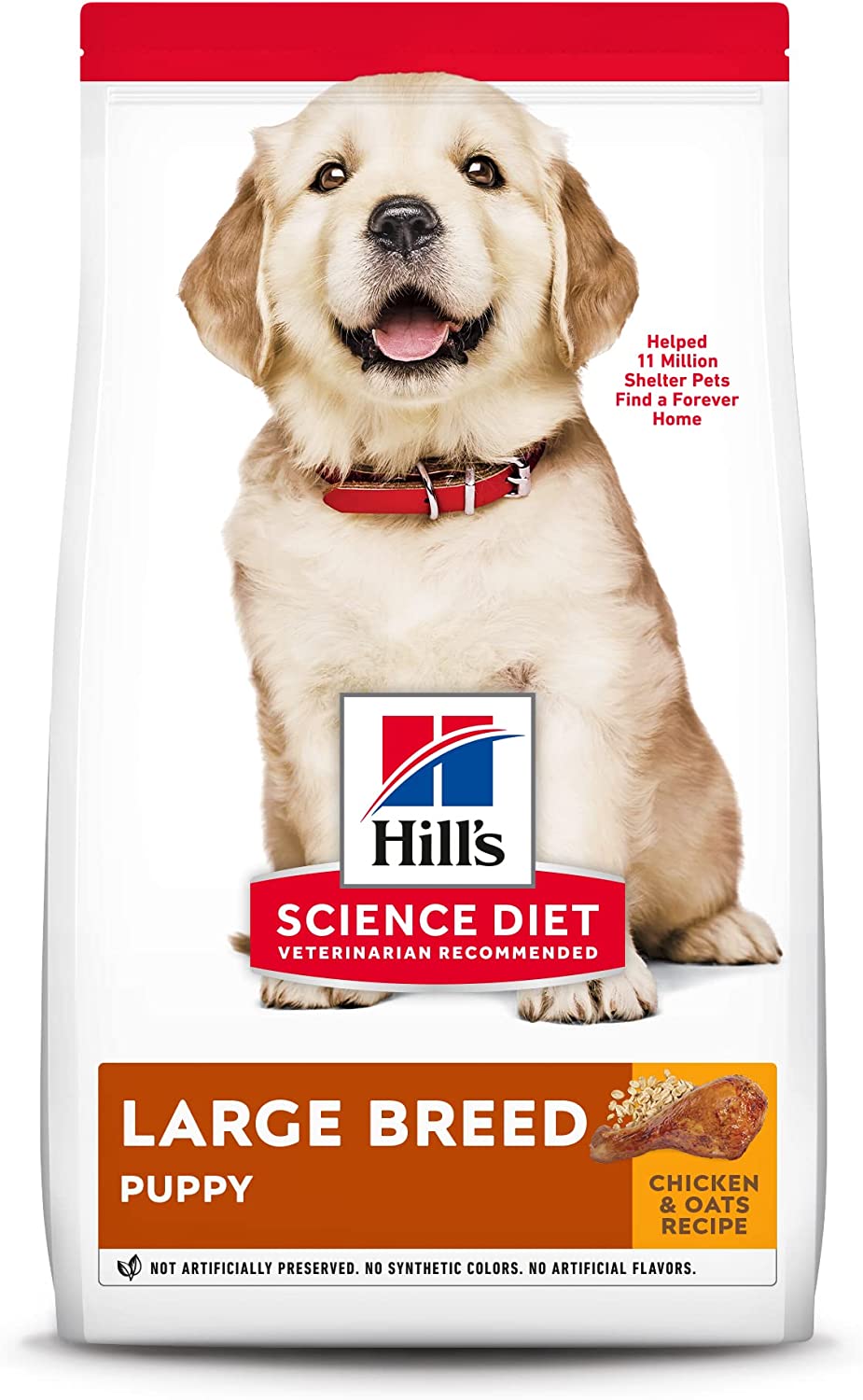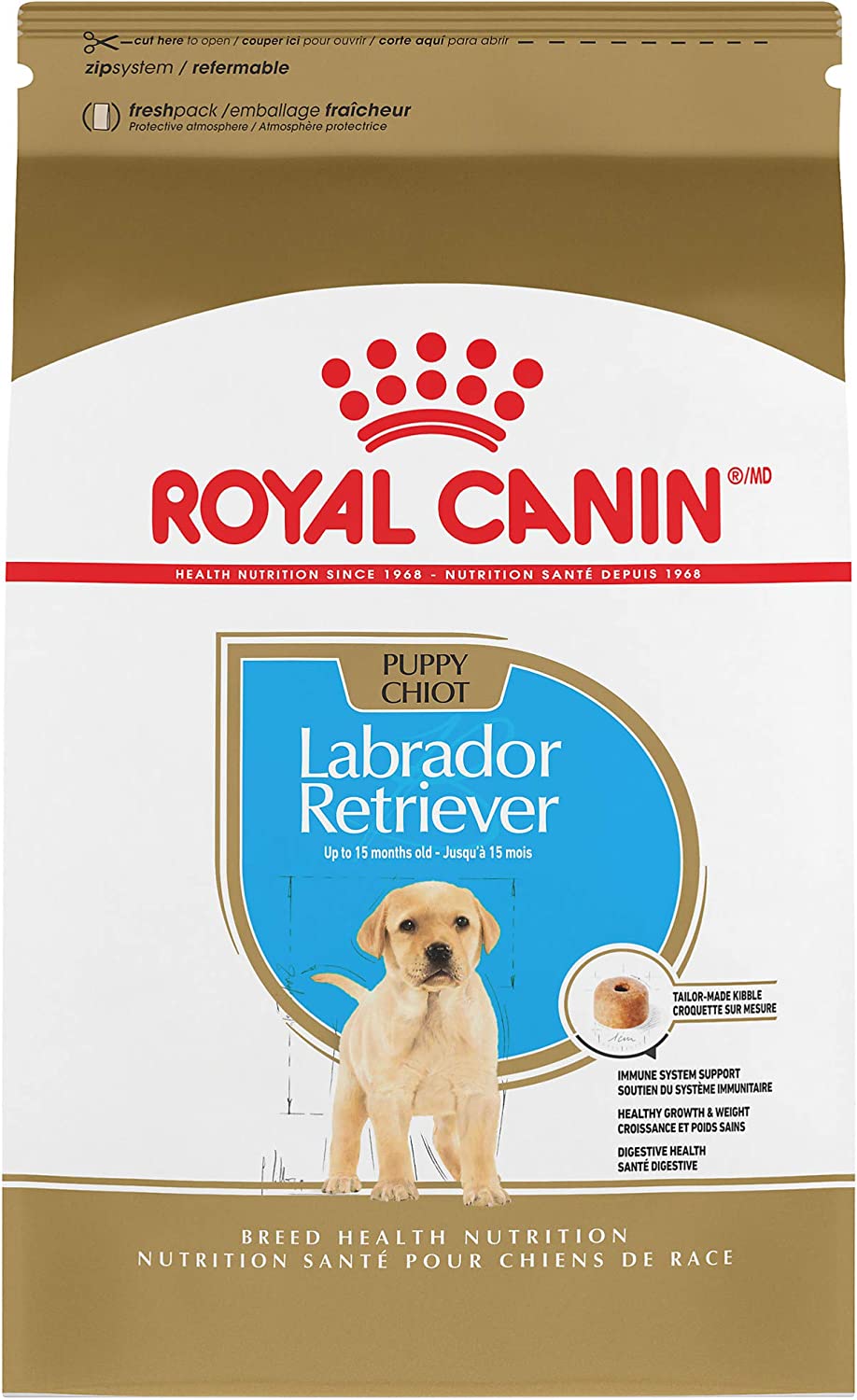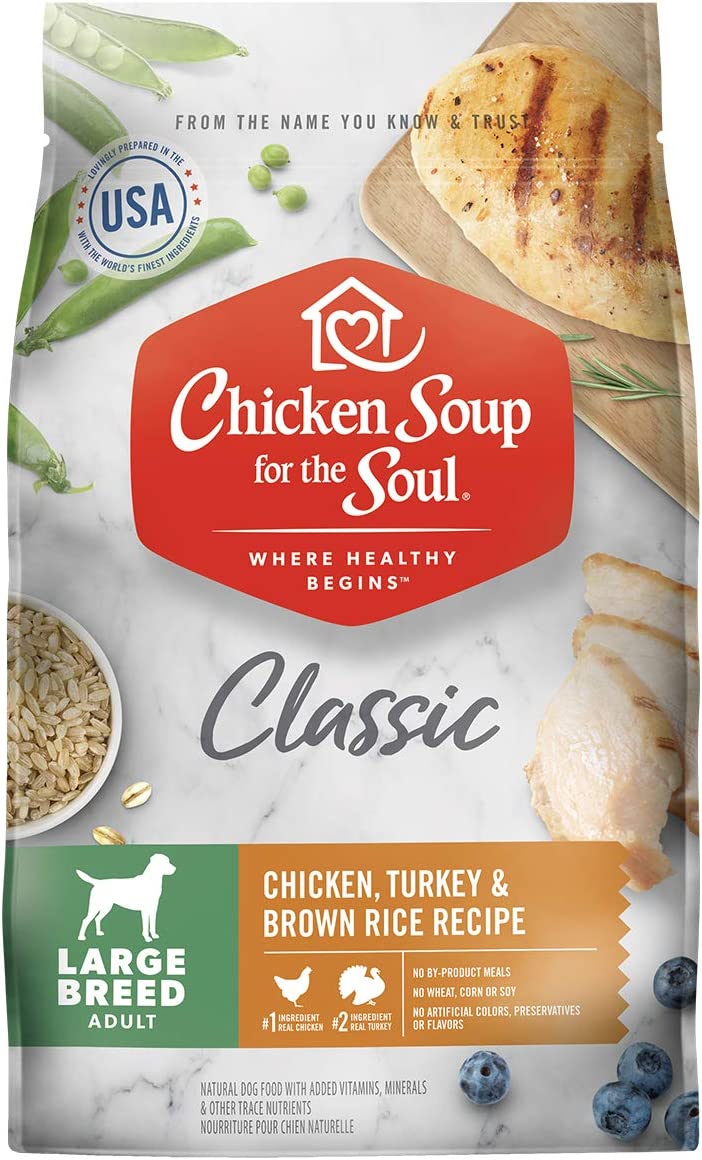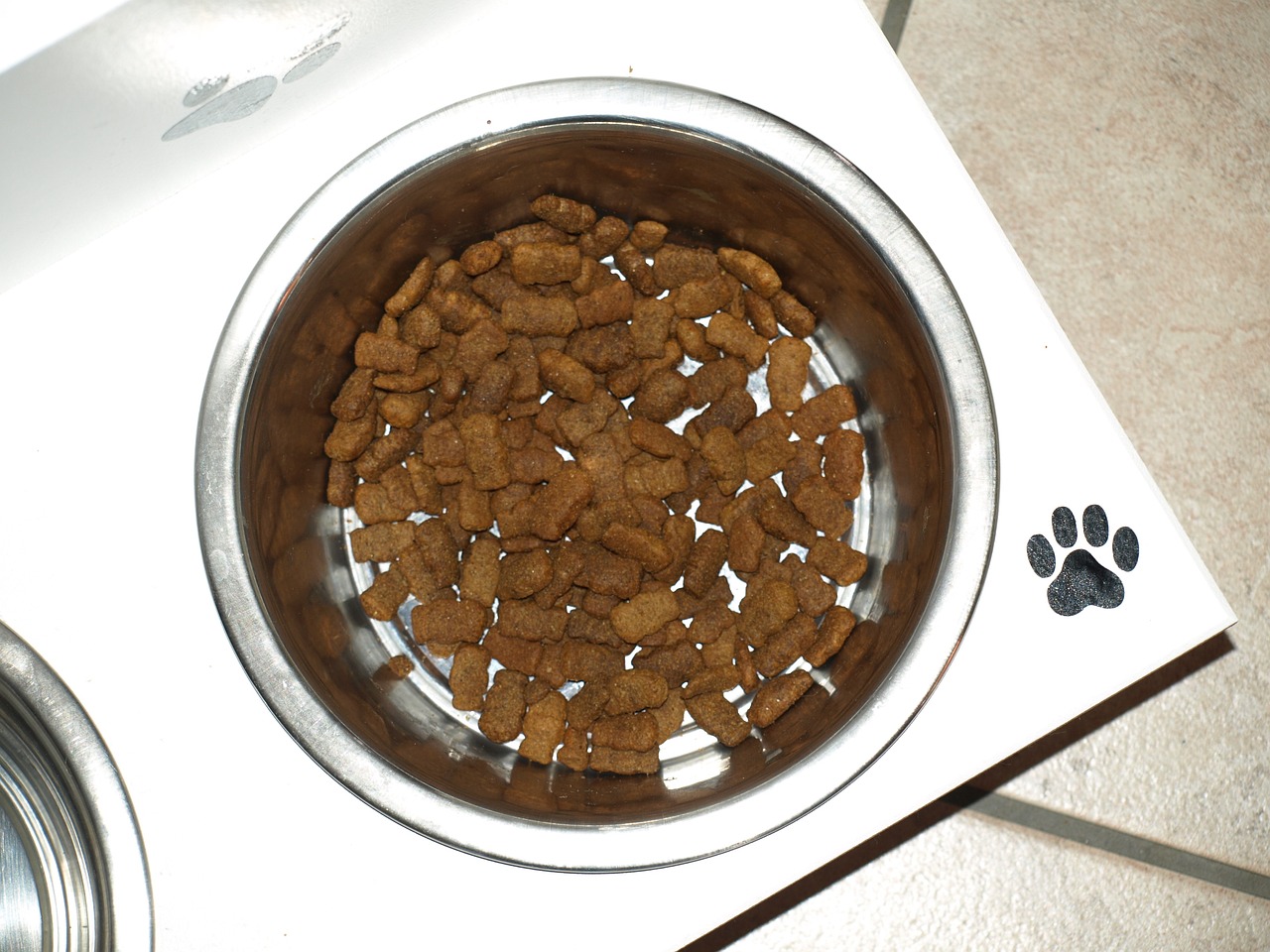Best Dog Food for Labrador Puppy: 3 Healthy Picks!
Have you recently adopted a Labrador pup? Or are you looking to switch your young Lab’s food to something better? Either way, you’re better off buying the best dog food for Labrador puppy. It guarantees healthier growth, keeping your young Lab fed, happy, and growing!
The best dog food for Labrador puppies uses top-quality ingredients, balancing nutrition, taste, and value in one package.
I’ve reviewed over 20+ dog foods made for Labrador puppies and highlighted the three best to consider. See which dog food suits your young Lab best!
| DOG FOOD FOR LABRADOR PUPPY | BRAND | EXPERT RATING | CHECK PRICE |
|---|---|---|---|
 | Hill's Science Diet Chicken Meal and Oats Large Breed Best Dog Food for Labrador Puppy | CHECK THE PRICE ON AMAZON | |
 | Royal Canin Large Breed Healthy Recipe Dry Dog Food for Labrador Puppy | CHECK THE PRICE ON AMAZON | |
 | Chicken Soup for the Soul Large Breed Dry Dog Food for Puppy and Adult | CHECK THE PRICE ON AMAZON |
What’s the Best Dog Food for Labrador Puppy?
OUR #1 CHOICE
OUR TOP PICK: Hill’s Science Diet Chicken Meal and Oats Large Breed Best Dog Food for Labrador Puppy
Hill’s Science Diet Puppy Large Breed is the best dog food for a Labrador puppy. This recipe has all the nutrients a growing Lab pup needs, ensuring seamless growth and development.
By glancing at its packaging, you can already tell your Labrador will adore this kibble! After all, its recipe caters to the needs of large dog breeds like your Lab. The main ingredient of this dry dog food is quality chicken meal, building and maintaining lean muscles.
Moreover, it contains calcium to improve bone growth and development, perfect for Labrador 10 months below. Calcium aside, this dog food also has a healthy balance of minerals and vitamins, aiding your Labrador’s overall health. And the added fish oil helps your puppy’s visual and cognitive development.
Each serving of this dry dog food gives your Labrador puppy up to 400 calories, just enough to keep it going. It’ll fill up your Lab without constraining its body, allowing it to enjoy a tasty meal without much effort.
You can guarantee quality ingredients as everything used for this dry dog food hails from the United States. Hence, many professional veterinarians stand by Hill’s Science, the perfect balanced recipe for growing Labradors!
CHECK THE PRICE ON AMAZON
Summary
Enjoy the perfect balance of nutrition, convenience, and taste in one package with Hill’s Science. Its Large Breed recipe has the perfect coverage of ingredients crucial for a growing Labrador’s needs. From calcium, and top-quality protein, to DHA — this dry dog food recipe has it all.
PROS AND CONS OF THE Hill’s Science Diet Chicken Meal and Oats Large Breed Best Dog Food for Labrador Puppy
-
Professional veterinarians recommend this dry dog food.
-
It has calcium for better bone growth.
-
The recipe contains DHA for better cognitive and visual development.
-
It’s low in calories.
-
Each serving provides your Labrador puppy with the nutrients it needs.
-
Your Labrador pup might not like this kibble’s flavor right off the bat.
RUNNERS-UP
Royal Canin Large Breed Healthy Recipe Dry Dog Food for Labrador Puppy
If you’re ready to go all out for your Labrador puppy’s dog food, choose Royal Canin. Notorious for its steep prices, Royal Canin is one of the most famous high-end brands for dog food. But they charge high rates for a reason, as they’re one of the few manufacturers that make breed-specific puppy food.
Their Large Breed Healthy Recipe, Dry Dog Food, is perfect for growing Labradors, catering to their expansive needs. And as its name states, this dog food caters to large dogs, boasting high protein content and DHA. The former guarantees better muscle growth for your Lab, ensuring smooth development.
Meanwhile, the added DHA (Omega-3 fatty acid) improves your Labrador puppy’s cognitive development. Aside from that, this recipe has zero chemical preservatives, keeping everything all-natural for your Labrador puppy.
Eating this kibble shouldn’t be an issue as it’s been designed for easy pickup and chewing for a growing Labrador.
But what makes this dry dog food stand out is its use of prebiotics. These added components aid Labrador puppies’ digestion, promoting better stool quality.
The downside of Royal Canin’s Large Breed Dry Dog Food is its price and quantity. Unlike its steep price, its serving size could be more impressive, which can be an issue for a Labrador puppy’s growing appetite.
THE PROS AND CONS OF THE Royal Canin Large Breed Healthy Recipe Dry Dog Food for Labrador Puppy
-
This recipe is formulated to cater to the needs of a growing Labrador puppy.
-
It contains DHA (Omega-3 fatty acids) for improved vision and cognitive development.
-
It uses top-quality protein.
-
The formula has prebiotics for easier digestion.
-
It doesn’t contain any chemical preservatives.
-
It is expensive.
-
The quantity is small for its price.
CHECK THE PRICE ON AMAZON
Chicken Soup for the Soul Large Breed Dry Dog Food for Puppy and Adult
Are you looking for affordable, high-quality dry dog food for your Labrador puppy? Famous dog food manufacturer Chicken Soup for the Soul has you covered! Its Large Breed Dog Food recipe is flexible and perfect for young and old Labs.
You don’t have to worry about this dry dog food’s nutritional content, as it contains everything a growing Labrador puppy needs. It lists real chicken as its primary ingredient, giving your pup all the protein it needs. You can ensure your Labrador enjoys healthy and proper muscle growth.
Moreover, this dog food’s use of calcium and phosphorus helps guarantee better bone development for your Lab puppy. As a result, your growing Labrador puppy can also enjoy stronger joints over time! And it’s impressive how nutritious this recipe is as it contains healthy fatty acids Omega-3 and -6.
Adding these nutrients helps boost your young Lab’s immunity while guaranteeing a luscious coat as it grows.
But since this is budget-friendly dry dog food, its taste might be less appealing to a Labrador puppy. And this can be especially tricky since younger Labs have picky palates! So, you may need to mix these kibbles with your Labrador pup’s favorite wet food or BARF.
THE PROS AND CONS OF THE Chicken Soup for the Soul Large Breed Dry Dog Food for Puppy and Adult
-
This dry dog food is affordable.
-
It uses top-quality ingredients.
-
This formula boasts high protein content and DHA.
-
Its primary ingredient is “whole” chicken.
-
It has added calcium and phosphorus for better bone growth.
-
The flavor isn’t the best, making it a little bland.
-
It might not be the best dry dog food for picky Labrador puppies.
CHECK THE PRICE ON AMAZON
What to Consider When Shopping for the Best Dog Food for Labrador Puppy?
With the many dog food formulated for puppies, finding the best one for young Labs can be difficult. So, to help you seek the best dog food for Labrador puppy, I’ve listed some factors to consider!
Carefully review each one, and you’ll be able to find the best dog food for your Lab pup in no time.
🦴 The Dog Food’s Brand
Regarding dog food for Labrador puppies — the brand matters a LOT. After all, young Labs have more sensitive stomachs than their adult counterparts. And you must ensure the brand uses quality ingredients and processes its kibble well.
Ideally, it’s best to settle for dog food brands made by veterinary nutritionists and backed by proven scientific research. You can determine whether these companies have participated in AAFCO feeding trials. Their participation guarantees they’ve invested well in research to guarantee zero nutritional deficiencies in their products!
Remember to choose a reputable dog food brand with accessible formula information. Only then you’ll be able to guarantee a balanced and healthy diet for your Labrador puppy.
🦴 The Fewer the Preservatives, the Better
Although they extend your Labrador puppy’s dog food’s shelf life, it’s better to settle for those that use fewer preservatives. Avoiding dog food formulas with toxic chemical preservatives BHA and BHT would be best. Although they’re safe for us to consume, they can harm dogs, especially young Labradors!
Always prioritize dog food with natural preservatives like tocopherols or rosemary. There are more you can browse, but these organic preservatives are only sometimes necessary. As long as the formula doesn’t have BHA or BHT, it should be safe to consume by your Labrador puppy.
🦴 Protein Content
Growing Labrador puppies need a TON of protein to supplement their growing body and muscles. The best cuts of meat for this breed are lamb, chicken, bison, and cattle — basically, any meat that’s “whole.”
Aside from that, exotic dog food brands also use alligators and other unusual cuts of meat. And though these are safe for your Lab puppy, give these as treats instead of their actual meals. After all, gator and other exotic meats are something dogs consume infrequently.
You can guarantee high protein content in a dog food formula if it features whole meat as its first ingredient. And I suggest avoiding or limiting your use of dog foods with animal by-products. These provide little to no value for your Labrador, only making it hungrier!
🦴 Healthy Fatty Acids
Another vital component for growing Labrador puppies is healthy fatty acids. Specifically, you must ensure your young Lab’s dry dog food contains Omega-3 and -6 fatty acids to guarantee the best results. Often labeled as “DHA,” it helps in brain and eye development. Aside from that, DHA also aids in heart and liver health for Labrador puppies.
Some experts claim that DHA can help prevent cancer and arthritis in young Labs later in life.
The best sources for DHA are fish components or fish oil. But the downside of this nutrient is that it can add a pungent smell to your Lab pup’s dog food. Although some puppies get enticed by the potent scent, others don’t like it.
🦴 Calcium and Phosphorus for Proper Growth and Robust Joints
Ensuring proper bone and teeth development is crucial for growing Labrador puppies. Hence, choosing a dog food formula with calcium and phosphorus is essential. These minerals help maintain proper bone and tooth growth. And since tooth decay is a prevalent issue with Labradors, buying dog foods formulated with these minerals can help your Lab avoid it!
🦴 Antioxidants for an Immunity Boost
Labrador puppies are more sensitive and prone to health issues than their older counterparts. And you can help these young pups become more robust by choosing dog foods filled with antioxidants!
It’s best to introduce your Labrador puppy to antioxidant-rich foods young, as specific problems that would pop out in their early years may persist for the rest of their lives! You can find antioxidants in superfoods like broccoli and berries, which some dog food brands incorporate in their recipes.
🦴 The Bigger the Dog Food’s Quantity, the Better the Value for You and Your Labrador Puppy
Since you’re raising a large dog, investing in bigger-quantity dog foods for Labrador puppies is better. Choose larger dog food bags to get the most value for your money while ensuring your Lab pup gets fed! Not to mention this saves you from re-ordering and visiting the store repeatedly.
🦴 Price of the Dog Food for a Labrador Pup
Finally, carefully consider the dog food’s price, as raising large breed dogs, like the Labrador puppy, can be expensive. Note that the higher-quality dog foods will, of course, come at a higher fee. And as tempting as it is to settle for the cheapest rates — don’t! After all, it can compromise your Lab pup’s health early on, making it more vulnerable to health conditions.
So, even if the dog food’s a little pricy, it’s better for your Labrador puppy’s health.
How to Choose the Best Dog Food for a Labrador Puppy?
Raising a Labrador puppy introduces you to three kinds of food these young pups can enjoy — dry dog food (kibbles), BARF, and wet dog food. Knowing the best time to give each type of food to your Lab pup is crucial to guarantee healthy growth and strong joints!
Kibbles, aka Dry Dog Food
Dry dog food or kibble is the most flexible food for Labrador puppies. It has incredible nutritional value and a convenient design that makes eating easier for a young Lab pup. Hence, it’s become a popular choice for breeders and casual owners alike, providing an excellent testimony to dry dog food’s top-quality and nutritional value.
This food for a Labrador puppy comes in bite-sized pellets for easy consumption. You can find all ingredients used for the dry dog food feature in each kibble. With this, you can ensure you can feed even the pickiest Lab puppies — offering complete nutrition and taste.
Since dry dog food is designed for adult Labradors and pups alike, it can give your young Lab the perfect balance of nutrients in each bite. Due to this, adjusting a Lab puppy’s diet is simple, keeping obesity at bay.
But note that the dry dog food’s quality affects how fast your Labrador puppy will get full. After all, many cheaper dog food brands fill up their kibbles with unhealthy fillers. They don’t give any nutritional value, only adding weight to the food — leaving your Labrador puppy craving more.
Another issue with kibbles is that poorly-made ones can harm a young Lab’s digestive system. After all, they can go through a Labrador’s gastrointestinal tract without getting absorbed well. And this can cause constipation in young Labs, which can be fatal when not addressed ASAP.
Therefore, only feed your Labrador puppy with top-quality dry dog food for better nutritional and monetary value over time. It’s safer for your young Lab’s digestive system, allowing it to enjoy quality food and taste without missing nutrition!
Wet Dog Food
Wet dog food is a hit among young and old Labradors, providing incredible taste and decent nutritional value. But it’s crucial to check the nutritional efficiency of wet food as most contain little to none. And since most of this dog food’s weight comes from water and meat by-products, you’re getting little value in return.
Another downside with wet dog food is that you can only store it for a short time once you open it. Hence, you need to give all the content to your Labrador puppy in one sitting. And this can be harmful to the pup’s mindset as it’ll believe it needs to eat that much per meal.
So, unless your vet puts your Labrador pup on an all “wet” dog food diet, don’t feed your Lab puppy this. And if you want to, you can give it to your Labrador puppy as an occasional treat.
BARF (Biologically Approved Raw Food)
Many vets today suggest kibble as the “base” or “routine” meal for Labrador puppies thanks to its balanced nutritional profile. But some veterinarians still stand by the more natural, biologically approved raw food, or BARF, for short. You can make BARF at home or buy it from your local store.
Homemade BARF uses raw cuts of meat or bones as the main ingredients, with added veggies, fruits, and raw eggs. Thanks to this, the BARF diet may stimulate your Labrador puppy’s tastebuds better. After all, your pup will get different and more natural meals, a stark improvement from dry food.
Meanwhile, commercial BARF comes in meat-based putty, often sold as fresh or frozen.
BARF can be an exciting addition to your Labrador puppy’s diet. And some even switch kibbles for the complete BARF diet. But as fun as BARF sounds, it has many downsides you must know for your Labrador puppy.
Firstly, the raw cuts of meat used for the BARF diet have been discovered to have infectious pathogens dangerous for your Lab puppy — and yourself. And this can lead to bacterial infections, which can be fatal to a young growing Labrador pup.
Moreover, knowing the exact nutritional value of BARF is challenging, especially if you’re making it from scratch at home. And with this, you might be feeding your Labrador puppy the wrong amount, taking a toll on its health early.
Finally, the bones included in the BARF diet can pose a choking hazard for young Lab puppies. So, as healthy and natural BARF is, it can be an inconvenience later on, draining your wallet due to the use of natural ingredients.
Frequently Asked Questions
Q: What is the best dog food for Labrador puppy that’s natural and easy to get?
A: Meat is the best natural dog food for a Labrador puppy, as it packs all the protein a growing Lab needs. Aside from that, you can balance the cut with whole grains, such as rice or pea. These are nutritious for Labrador puppies, filling them up with constraining themselves. And remember to give your Lab pup a meal with healthy acids now and then for healthy growth.
Q: What food can’t a Labrador puppy eat?
A: Onion is among the most toxic foods for dogs, and you should keep it away from your Labrador puppy. Raw, dry, fried, or boiled onions are hazardous to Labradors. And when consumed, it can cause severe gastrointestinal irritation and internal bleeding. Other dangerous foods for Labrador puppies are chocolate, avocado, alcohol, etc.
Q: Is Pedigree a decent brand for a Labrador puppy?
A: Pedigree, dry puppy dog food works well for large breed dogs, like the Labrador. After all, all recipes contain generous amounts of healthy fatty acids and Glucosamine. These two guarantee healthier growth and robust joints, preventing various issues as your Lab pup grows up.
Q: Is feeding my Labrador puppy rice a good idea?
A: Cooked white rice is an excellent treat for a Labrador puppy when sick. This grain is easy to digest and prepare and boasts low fiber, perfect for Lab puppies with an upset stomach! But only feed your young Labrador white rice now and then.
Q: Can I give my Labrador puppy milk when eating dog food?
A: It’s best to give your Labrador puppy milk when it’s not eating. Only provide this as a treat to your pup, as too much consumption can cause several issues. Firstly, your Lab puppy might develop diarrhea, vomit, or have difficulty pooping due to loose stools. And these can lead to rowdy behavior, stunting your Labrador pup’s growth and mental development.
Final Words
The best dog for Labrador puppy ensures healthier and smoother growth. And no matter how picky your young Lab is, those listed guarantee chow downs like no other! After all, not only do they offer nutritious value, but also incredible flavors. And all you need to do now is see which dog food your Labrador puppy likes best.







